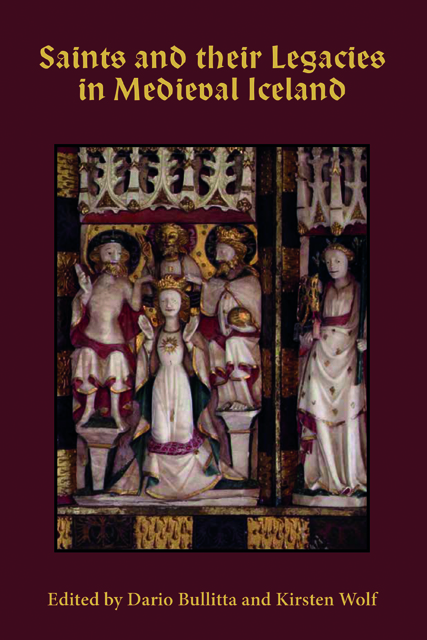Book contents
- Frontmatter
- Contents
- List of Illustrations
- List of Contributors
- Acknowledgments
- List of Abbreviations
- Introduction: The Splendor of the Saints
- Rannsǫkun Heilagra Bóka: The Search for Holy Books
- Heilagir Byskupar: Holy Bishops
- Heilagir Karlar ok Englar: Holy Men and Angels
- Heilagar Meyjar: Holy Maidens
- Bibliography
- Index of Manuscripts
- General Index
- Studies in Old Norse Literature
7 - Remembering Saints and Bishops in Medieval Iceland
Published online by Cambridge University Press: 14 January 2023
- Frontmatter
- Contents
- List of Illustrations
- List of Contributors
- Acknowledgments
- List of Abbreviations
- Introduction: The Splendor of the Saints
- Rannsǫkun Heilagra Bóka: The Search for Holy Books
- Heilagir Byskupar: Holy Bishops
- Heilagir Karlar ok Englar: Holy Men and Angels
- Heilagar Meyjar: Holy Maidens
- Bibliography
- Index of Manuscripts
- General Index
- Studies in Old Norse Literature
Summary
There was probably no fear that saints would be forgotten in the Middle Ages. Saints were assigned specific feast-days and liturgical calendars served as an aid to commemorate them. Various forms of commemoration in creating and transforming cultural memory, such as devotional and liturgical practices, and material aspects in the form of relics, devotional objects and manuscripts. People who attended masses and divine offices would have known about the saints and could therefore have retold stories of their lives and passions from memory. It is also likely that stories of the national Icelandic saints were kept in people’s memory, associated with the places where they had dwelled and visited. Medievalists have studied memory in association with orality for a long time. In this chapter, I focus mainly, but not exclusively, on ‘learned memory’ (memoria artificialis) as opposed to ‘natural memory’ (memoria naturalis). Natural memory is the natural ability to remember, yet memory that could be trained and improved with special methods is understood as learned memory. Scholars such as Mary Carruthers and Brian Stock have drawn attention to the interplay between the written and the spoken, between the book and memory, rather than seeing the written and oral as two separate cultures.
Christianity brought to Iceland books and the art of reading and writing in the Roman alphabet, while the new faith introduced and fostered an imported textual culture, which often relied on the oral transmission of illiterate informants, who constantly memorized, kept, and recalled highly valuable knowledge. In his Íslendingabók, composed in the years 1122–1133, Ari Þorgilsson mentions several informants, the oldest being Hallr Þórarinsson (995–1089). Besides, he refers to wise people and general knowledge and remarks that his informants are endowed with good memory. About his paternal uncle Þorkell Gellisson (c. 1030–1074) he writes that he ‘es langt munði fram’ (‘rememberd a long way back.’) Hallr Þórarinsson, an important informant about the Conversion, is said to have had ‘minnigr ok ólyginn ok munði sjalfr þat es hann vas skírðr, at Þangbrandr skírði hann þrevetran, en þat vas vetri fyrr en kristni væri hér í lǫg tekin’ (‘a reliable memory and was truthful, and remembered himself when he was being baptized, [and] told us that Þangbrandr had baptized him when he was three years old, and that was one year before Christianity was made law here’).
- Type
- Chapter
- Information
- Saints and their Legacies in Medieval Iceland , pp. 175 - 194Publisher: Boydell & BrewerPrint publication year: 2021



